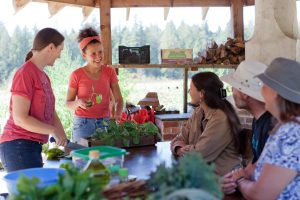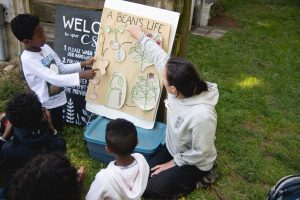Farm to Families
Creation, Agriculture , FoodContributed by: A Rocha
Every bite we eat connects us to the places where our food was grown. This experience, though easily overlooked, affords us a unique encounter with creation right at our plate – and if we’re attentive enough, an encounter with the goodness of the Creator as well.
It can be said, then, that food has the power to nourish us in more ways than one.

So when food security affects more than 30 percent of the world population, according to the Food and Agriculture Organization of the United Nations, what are we to do? How do we as Christians reconcile with this reality and seek justice for those most affected by the inequitable access to food?
Families, seniors, newcomers, and refugees are particularly vulnerable to food security issues. In Canada, 5.8 million people lived in food-insecure households in 2021, based on the latest data from Statistics Canada.
While these numbers can be equally daunting as they are discouraging, our response is one that is rooted in hope to care for the earth and its people as part of God’s redemptive work.
At A Rocha Canada, our Farm to Families program connects those most vulnerable to food insecurity to fresh, seasonal food by providing hands-on training in gardening, food preparation, and nutrition. Located at the The Brooksdale Environmental Centre, a 28-acre property in Surrey, British Columbia, the program gives under-served children, families, and seniors access to garden-sourced snacks, community-shared meals, and vegetables grown without the use of synthetic chemicals both to the land and the food itself.

In 2021 we met Romina, a newcomer to Canada, along with her husband and three children. Romina’s husband was laid off during the pandemic which made their already difficult situation worse as they were learning a new language and supporting their childrens’ adjustment to school, all while navigating the complexities of accessing newcomer services.
We partnered with a service agency to connect Romina and her family to fresh food donations and education workshops that helped her learn how to cook with unfamiliar ingredients. Romina was delighted and relieved to know that her family could enjoy nutritious food and felt better equipped to prepare healthy meals at home. She gained confidence, a community, and perhaps most importantly, a sense of connection with food and creation altogether.
This program is much more than providing those in need, like Romina, with access to fresh produce and educational workshops – it’s a way to experience creation and the love of the Creator in a tangible yet remarkably profound way. It is by no means the solution to the larger social justice issue of food insecurity, but it is our humble offering to care deeply for God’s people and places right here at home.
So what is the way forward?
Hope is the way forward.
When we take time to consider our own food, their sources, and the larger food systems and issues that surround them, we are taking a step towards answering God’s call to be stewards of the natural world. When we share our time, talent, and treasure with those in need – whatever the need may be, we are inspiring hope in the world. And this hope, we know, fuels action. This hope is what guides us to “act justly, love mercy, and walk humbly with our God” (Micah 6:8).
By A Rocha Canada

